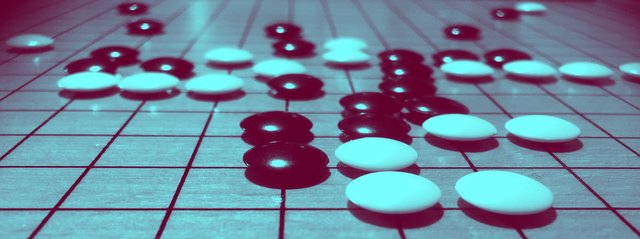Can a game operate my brain?

I was 23 when I was introduced to a game that would fundamentally change the way I deal with losing. Particularly losing to other people.
At first I was enticed by the anecdotes: a game 3000 years old — older than the Roman Empire — had to be somewhat good. This game’s skill grading system was the inspiration for martial arts’ belts and dans. The possibilities of different matches exceed the number of atoms in our known universe. Even the world's first superpopular videogame console, Atari, was named after a type of position in the game.
Of course I’m talking about the ancient chinese boardgame mostly known as Go.
Go gets to you like a Russian doll.
At first I understood and appreciated the nicely designed logical challenge: the players have very similar resources and a lot of space to skirmish with each other. Whoever calculates better wins, so to speak.
One month in I started to appreciate the more nuanced aspects of it. How my personality, even my day’s mood would influence my playstyle. How I could read and in fact study famous matches that were played 300 years ago.
Three months in I could see the board’s patterns everywhere: in windows, clothes, faces. I’d picture the game’s lines in buildings on my way to work and I’d mentally place some stones on them and challenge myself to a miniduel.
All of that was a powerful experience, a rendezvous with zen and my own capacity for obsession.
But my catharsis went one step deeper.

The honour of losing (badly)
Picture the stereotypical 15 year old white male, the soul of early puberty — foul smelling and all. Now challenge him to… well, anything.
Does he accept your challenge? Hell yes. He’ll do anything to prove he is capable, he’ll follow you to the ends of the Earth.
Then you win.
Does he take it well? Of course not. He’s quick to anger and quicker to blame. He’s finally grasping the first threads of control over his life and he won’t simply accept being defeated.
He will squeal.
That was me. Not by accident, by design: I was born into a culture where being a winner, whatever that meant, was of utmost importance — and the first step to become a winner? Trying. Trying to win as hard as you could.
Now I was 23 and smelling significantly better than my teen self. Still a horrible loser though.
This new friend tells me about the marvels of this game called Go and promises to teach me. We go to a park, open a board and she patiently explains the rules.
Then she says we can try a first match. Since I’m a new player I can start with a tremendous advantage — something like playing chess against an opponent without pawns or playing poker in a table where only you can play the clubs suit.
In the height of my cockyness I think I can win, I truly do — I even say it out loud, something along the lines of “if you don’t pay attention I might end up winning”. Sure, sure — she assures me.
It’s a massacre. We battle for about half-an-hour and every single move I make, she waltzes around it and kicks me in the butt a moment later.
My poor pieces are getting more and more cornered. Eventually, she states the obvious: the game was over, I had no way to turn it back. I accept my defeat thinking to myself that I might benefit from a couple of online tutorials. We start to collect the pieces from the board.
Then, she does something remarkable.
She starts to replay our match — she places the first stone, then the second. One move after the other, hundreds of different stones, both mine and hers as if she had recorded it in a video camera. This is the moment I feel the abyss between our skill levels and realise in her drunkest day she could still smash me to smithereens.
Then she explains to me how she was trying to test me — creating many different traps, showing evident weaknesses, luring me into dangerous plays — to see how much I could foresee.
This is called Shidou-go. It’s a simple concept really: you’re not playing to win, you’re playing to teach. Your job is to create interesting situations where your students can actually test the peak of their skills.
That day, the persona forged by my younger 15-year-old self, started to crack. By the end of this study session, I knew at least a couple of the tricks she used to defeat me. Next time I’d have to capitalize on that and she’d have to come up with new, stronger tricks, which in turn I’d have the chance to learn.
I had just lost a game pretty badly, but in those 15 minutes of immediate study, I had learned how to improve. Better still, I could steal the moves she had just taught me and use them against other players. Even against her.
Suddenly this whole winning thing came into perspective.
Winning that one specific game was less important than learning a trick I could use in every game from that point on.
It didn’t take a full month before I started applying the same logic to failed job interviews and fights with my parents. It was not about winning that one time, it was about learning as I journeyed on.
The seed was planted. The path forward was inevitable.

Yeah, I totally meant that
Primordial China is as culturally far from my XXI century Brazil as it gets — I’m sure the golden palace lords would enjoy a fine caipirinha, they were just a good 5500 years too early, but I digress. The point is: even if the ancient genius who created this game and I share a craft, I can’t possibly know what he was trying to accomplish (I don’t even know if it was a he, but the myths are quite cool).
Was he indeed trying to change the player’s behaviour outside of the game space?
I will never know, but I can judge the results: it provoked the change in at least one human. Judging by my small conclave of Go-enthusiast friends and multiplying by the game’s popularity and its sheer age, it changed millions.
Once you have experienced this behaviour change (and especially in a clear-cut way as I did myself), you open your eyes to the possibility of making it happen yourself.
By no means I’m the only one trying this. For example:
Everything
This is a game so clearly focused on conveying the teachings of Alan Watts in an interactive way, that part of the gameplay is literally listening to his old recorded classes as you explore the world.
It has a special focus on Watt’s idea of the interconnectedness of things — you may start the game playing as a cow, proceed to become a galaxy, have a brief moment as a magnesium atom and end up as a french horn. This is not an exaggeration — it’s the literal play.
If you’re anything like me, after you play for a couple of hours you might look at your nearest… anything, really: plant, lamp, building, moss, planet — and think of it under a new, more respectful light.
The Witness
How to approach Zen if Zen is supposed to be experienced and not learned? This is a game trying to mess with you: trying to flip your expectations and your senses so much that you might just end up in a state of perfect doing.
Not thinking, just doing.
Of course, getting there is hard, so it pushes you into a laborious journey. If you’ve ever watched those old kung fu movies where the great master is trying to teach the meaning of life by making the student carry rocks, that’s more or less the same vibe — and it bloody works.
Who knows? You might become a Zen master without carrying a single rock.
Missile Command
In the late Cold War days, the fear of nuclear missiles suddenly showing up on the California coastline was all too real. So a game designer called Dave Theurer makes a game about that. He strips the power fantasy from the player: you can only react and defend yourself, never attack back. Worse: as the game progresses the player inevitably has to make hard decisions like sacrificing civilians in order to protect a military base.
Years after the (very successful) release of Atari’s Missile Command, Dave still wakes up in the middle of the night, body sweating cold, thinking he just heard a warning siren — and that was the point.
According to him, this particular dread was the whole purpose of the game. In his words, “to show that if there was ever a nuclear war, you'd never win”.

A thought experiment
Behold, weary traveller! Now we leave the domain of facts and tread into the realm of intuition and experimentation! Walk with care and curiosity: the steps ahead are not proven knowledge, but a series of tests that might pull us in the right direction.
As I stated before, one of my pillars of life change is:
- A memory capable of changing one’s behaviour
But how to successfully create this memory? Harder still: how to create a measurable system that guarantees the memory was created — so the game can prove how many players are benefiting from its main goal?
One of the axioms of good game design, paraphrasing the legendary Mark Rosewater, is that you should always make the funnest, most interesting strategy also the optimal winning strategy — this way your players will be driven towards fun even if all they’re thinking about is winning.
My first thoughts on how to induce a new behaviour are: present the normal societal behaviour as a viable, yet sub-optimal strategy and the desired behaviour as the clear optimal path.
Now let us turn this thought into a tangible example:

Wreck the Echo Chamber, an early game concept
Most people agree that thick social bubbles and echo chambers are real problems (and if you don’t know what I’m talking about, perhaps you should watch this CGP Grey video) — a fact multiplied tenfold by the way our social media works. We like to hear people who agree with us, who are similar to us. In time, we are deprived of any different discourses and thus we only agree among ourselves and (in the worst cases) we keep agreeing on how the other side is wrong and evil.
So let’s make a game to challenge this: a game that is trying to make you think about the diversity of ideas in your social life. Here’s how it could work:
A The-Sims-style game, but focused on character development (and, if you’re familiar with the series, stripping away the whole home construction mechanics). Its main driving force is player expression — you can choose your character’s style, hobbies, career path, dreams, political opinions, even spiritual beliefs.
One of the main mechanics is throwing house parties! You invite other players’ characters and everyone who attends gets a bonus. By the end of each party, the players can see how great the party was (measured in points) and which topics the characters talked about.
A party full of scientists and sci-fi fans will present topics like quantum physics and a party full of artists and philosophers will boast topics like beauty.
Here’s the catch: those topics of conversation are the low level ones, scoring few points and thus giving little bonuses. Now if you happen to have a sci-fi fan and an artist in your party, you have a chance of scoring a rare beauty in quantum physics topic, which grants far more points.
Extrapolating that, a super mythic topic like gender fluidity secret societies in future Mars settlements requires an ultra-diverse group of people — and it’s a sight to behold! Not only for the points, but for its narrative payoff as well.
Those moments are the ones the player is going to remember and tell their friends — so they need to be quirky and hard to get.
The way we can measure our success is to track a specific kind of player: the players who start the game inviting similar characters to their parties and then over time change behaviour and start to throw ideologically diverse parties: this will prove that at least in the game boundaries a memory capable of changing their behaviour was established.
The game’s special events and media communication could also refer to real life situations, an extra pointer to the players that this sort of behaviour is valid in the real world as well.
So the next time you invite friends over, you might think to yourself: “What sort of interests and experiences do these people bring to the table that I could never provide myself?”
Do you think this idea could work?
Do you have any other ideas?
If you’re interested in this whole life changing game subject, my intention is to gather a community of people around it — who knows what sort of experiment this path might lead to?
The first article I wrote had quite a few responses, but I’m still figuring which platform would be good to host this group. For now, please keep in touch here: [email protected]
I’m interested in who you are and why this speaks to you, so please drop me a line.
Hi joriam,
Visit curiesteem.com or join the Curie Discord community to learn more.
You legends, thanks very much!
I assume you considered steem as a platform to host these "parties", what other alternatives are there though?
Hey =) Thanks for the comment!
Honestly, for once I'm trying to get my head out of an operational how-to mindset and just think about possibilities — so I didn't really think much about the nuts and bolts of the thing. Now that you mentioned, I'm here pondering how the blockchain could create interesting interactions, tracking your "theme journey" so to speak.
I'm not sure if it really needs something like that, but I think cool interactions could definitely arise!
Common, dopamine is the shit, one hit from that and you won't be able to turn it down, we can definitely use this here, your idea is genius, all that is needed is a system that can create all kinds of combination prizes, prizes that can be redeemable.
Congratulations @joriam! You have completed the following achievement on the Steem blockchain and have been rewarded with new badge(s) :
You can view your badges on your Steem Board and compare to others on the Steem Ranking
If you no longer want to receive notifications, reply to this comment with the word
STOPVote for @Steemitboard as a witness to get one more award and increased upvotes!